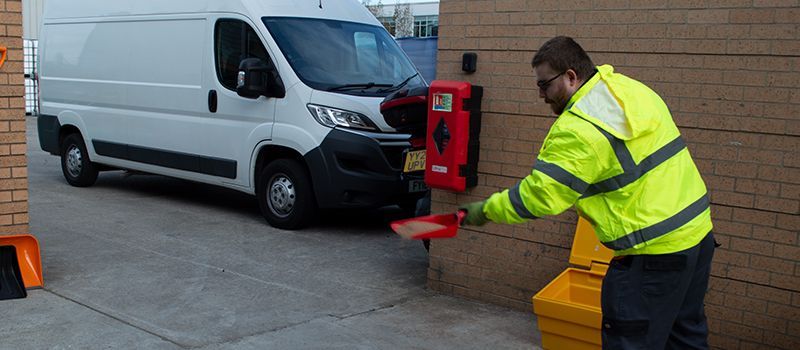With the onset of winter, councils throughout the UK are preparing for the worst of the weather. Every UK council has obligations by law to ensure that safe passage on a public highway is not endangered by snow and ice and any delay caused by adverse weather conditions are kept to a minimum.
Councils meet the demands of this legislation by ensuring that their road networks are treated with rock salt and also provide throughout their boroughs large numbers of grit bins, to ensure the public have access to stocks of rock salt in strategic positions.
Considering the high unpredictability of the weather in the UK, councils throughout the country provide an exceptional service in bad weather, with each council issuing a Winter Services Policy detailing their plans and preparations for winter.
Councils provide the ultimate service to the public regarding winter safety, but more and more legislation is being introduced referring to private companies regarding winter safety obligations.
Private companies also have obligations to ensure the areas around their premises are kept safe and as clear from snow and ice as possible, ensuring car parks, pavements, paths and entrances to buildings are kept clear. It’s essential that companies have some kind of policy and gritting schedule in place to ensure that work is carried out in wintery conditions. Any accidents that happen during snow and icy conditions on company premises due to trips and falls on ice can leave the company liable to a legal claim by the injured party.
On the other hand, Health and Safety regulations advise that under no circumstances must individuals or companies take it upon themselves to clear snow and Ice from the public highways. This is due to accidents and problems that could occur caused directly by the clearance work carried out. Again, this can lead to legal claims for any injury caused.
At gritbins.net we have a wide selection of products available to help companies keep the areas around their premises well maintained and safe during the winter months. All companies should ensure that a grit bin or a number of grit bins are placed in strategic positions on their premises. The size and number of grit bins and the positioning of them will be determined by the size of the premises and the features in the area around the outside of the building. It’s advisable for companies with larger premises that experience a high volume of foot and vehicular traffic to carry out a risk assessment to determine these factors.
At gritbins.net we have the largest range of grit bins available on the internet, to view our range of grit bins please click here.
Each grit bin should be fully stocked with rock salt. There are various types of rock salt and de-icers available on the market today, from the conventional brown rock salt, which is often called grit salt in the UK and is the most popular kind of salt used for treating snow and ice, to white rock salt, which is of a superior quality and will leave no residue after melting, thus ensuring that foot traffic in and out of buildings is residue free and will not cause damage to any floor coverings. A more recent innovation to the range of de-icers available today are liquid de-icers which are less corrosive and help keep any damage to plants and metalwork within the vicinity of the treated area to a minimum.
To view our range of rock salt and de-icers please click here.
In addition to making good use of grit bins and rock salt, a rock salt spreader will take the hard work out of treating larger areas such as car parks and access roads. Rock salt is placed into a hopper on the spreader and when the spreader is pushed forward, a mechanism beneath the hopper will spread the rock salt evenly over the area to be treated. Many various types of rock salt spreaders can be purchased on the market today. When purchasing a spreader, the main criteria to take into consideration is the amount of times the spreader will be used, the size of the area to be treated and the length of time in which you would like the spreader to accomplish the job. This will dictate the quality of the model required, as models have different sized hoppers, which in turn can hold different amounts of rock salt, various speeds can be achieved by the different types of products with some models being more robust than others.
We have a range of salt spreaders and towable salt spreaders to suit every application, to view our range please click here.






